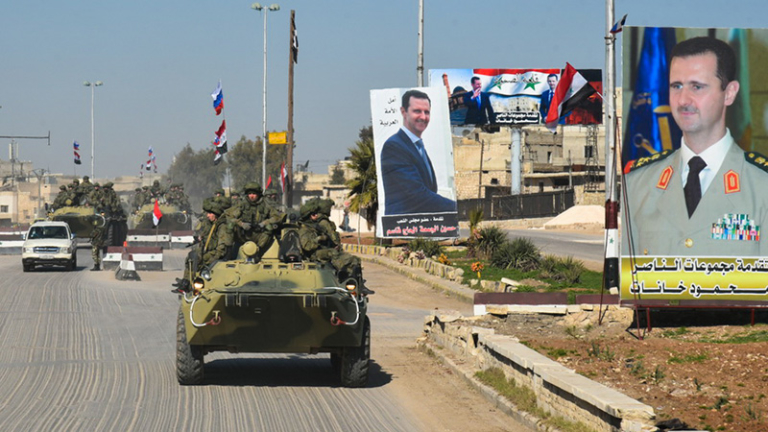
While the Russian military remains focused on trying to occupy strategically insignificant villages in the Donbas, Turkey-backed rebels have seized Aleppo, the second-largest city in Syria. They are advancing in other directions as well. Bogged down in Ukraine, Moscow is unlikely to be able to help its client, Syrian President Bashar al-Assad. But why are developments in Syria and Ukraine so interconnected?
By Nikola Mikovic
Russia got involved in the Syrian Civil War only in September 2015, when Assad’s Syrian Arab Army (SAA) was on the verge of collapse. In February of that year, Russian President Vladimir Putin signed the Minsk Agreements, effectively putting the Donbas war, which had broken out in the spring of 2014, “on hold”.
One month earlier, pro-Russian rebels were amid a military offensive, and the Ukrainian military was on the verge of collapse. But Putin decided to freeze the conflict and focus on Syria instead.
In October 2016, former Russian general Leonid Ivashov explained on Russian state-owned Channel One that the Kremlin’s engagement in the Syrian conflict was “critical to prevent the construction of the Quatar-Turkey pipeline, which would be catastrophic for Gazprom”.
Besides that, in the war-torn Middle Eastern country, Russia and the United States reportedly had the same opponent – the Islamic State (IS). The SAA would have had difficulty defeating the IS if it hadn't been for Russia and the Wagner Group. In 2015-2016, Russian forces, along with Hezbollah and other Iran-affiliated groups, also played an important role in the battle for Aleppo, significant parts of which were under the control of the Western-backed Syrian militias.
Indeed, Moscow and Tehran helped Assad stabilise the situation in Syria. The conflict was put “on hold” in 2020 when the last significant battles occurred. After that, Russia began preparing to invade Ukraine, while anti-Assad rebels, strongly backed by Turkey, used the “break” to consolidate, rearm, and continue with what they see as the Syrian revolution. The SAA apparently did nothing to prepare for another round of fighting.
2024 Russia is bogged down in Ukraine, with no strategic goals achieved. Hezbollah was defeated by Israel, whose military killed not only the group’s entire leadership but also dozens of top Islamic Revolutionary Guard Corps (IRGC) commanders in Syria.
The Wagner Group, following the murder of its founder, Yevgeny Prigozhin, has been integrated into the Russian National Guard (Rosgvardiya), with some of its elements deployed to Africa. Assad, therefore, is unlikely to be able to count on its help either.
His SAA seems to be on its own against well-armed and highly motivated Turkey-backed rebel forces. There are, however, two things that can prevent further falls in SAA-controlled cities. This time, it is Iran, rather than Russia, that could play a pivotal role in a new stage of the Syrian Civil War.
If Assad survives politically and biologically, it will likely be due to Tehran’s support. However, whether Iran has the capacity and political will to help the Syrian leader remains highly uncertain.
Also, a potential deal between Putin and the West could halt the rebels’ offensive, although that does not mean the SAA will recapture Aleppo or any other vital cities it has lost in the past few days. In other words, Putin would have to make serious concessions to the United States and its allies in Ukraine to be allowed to “save face” in Syria. But how likely is such an outcome?
Assad’s defeat would automatically signify Moscow’s defeat. If the Western-backed rebels seize power in Damascus, Russia will have to immediately shut down its Khmeimim Air Base in the Latakia area and the naval facility in Tartus. Since Russia and Syria have no land connection, the Kremlin would be forced to ask NATO member Turkey for permission to allow its vessels to pass through the Bosporus and Dardanelles on their way back to Russia.
To get the green light from Ankara, Putin may have to make concessions to his “friend”, Turkish President Recep Tayyip Erdogan. But that’s not all. On their way through the Black Sea, Russian vessels would become an easy target for the Ukrainian military.
All of the Kremlin's choices seem difficult. To avoid another large-scale humiliation, whether in Ukraine or Syria, Putin will have to pay a heavy price. Since reaching deals with the West (and then accusing his Western partners of “deceiving him” and “leading him by the nose”) seems to be the core of his reign, he is likely to try to use his old strategy: making painful concessions to the West and selling it to his audience as another “geopolitical victory.”
Syria and Bashar al-Assad could quickly become the most significant “collateral damage” of Putin’s approach. Given that Russia is not in a position to seriously help Damascus unless Iran intervenes, Assad will have a hard time stopping the rebels’ offensive. As a result, Russia could eventually lose Syria as an ally.
Pro-Kremlin analysts and propagandists have already started blaming Assad and the SAA for “not learning the lessons” from the Ukraine war and preparing for another round of fighting against Western-backed rebels. In reality, Assad is not an autonomous actor but a leader who remains utterly dependent on Moscow and Tehran. Therefore, for everything happening in Assad-controlled parts of Syria, Russia and Iran, as his significant sponsors, bear full responsibility.
Quite aware of that, many pro-Assad Syrians have already started blaming the Kremlin for the role it is playing in their country. They are unhappy about the fact that Moscow never prevents Israel from bombing SAA positions. Now that militants from the Jabhat al-Nusra group are advancing toward Hama, speculations in Syria are growing that Russia might betray Assad, which would have dramatic consequences for the Alawites, Christians, and other minorities in the Middle Eastern country.
One thing is for sure: under the current geopolitical circumstances, where Russia repeatedly shows weakness and suffers humiliation, it cannot have both Ukraine and Syria. It remains to be seen what Putin will decide to sacrifice. Maybe both?







Excellent article, and well-explained political perpexities.
This brings to mind the scripture prophecy that one day, "Damascus will be a ruinous heap." 📖